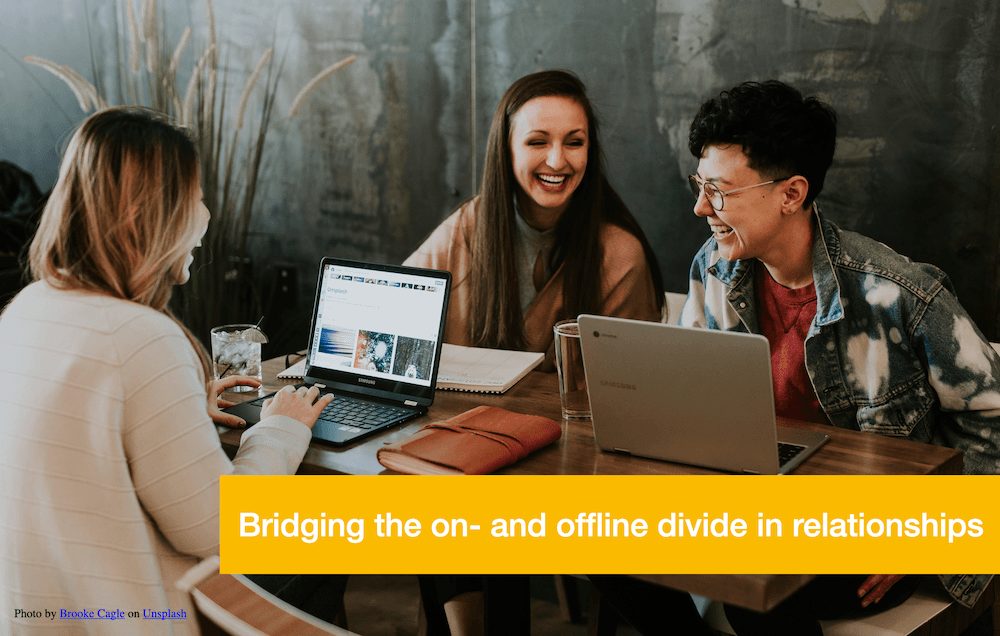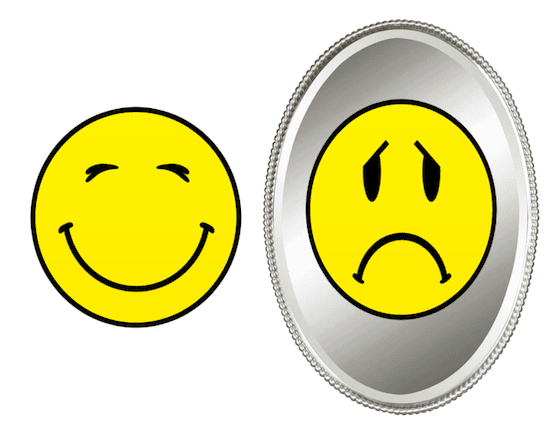I’ve long been intrigued by the way relationships are evolving with the onslaught of all these new technologies. Many are indeed disruptive of our old habits. Take walking down the street. Most individuals are engrossed in their smartphone or listening to mobile music rather than engaging with the general public (and cars or bicyclists driving by). When you contact a friend, is it rather by Messenger, Whatsapp, email or, heaven forbid, an old fashioned telephone call or handwritten letter? For many of us who began life with analogue-only relationships (let’s ignore POTS), the transition and translation of our relationships into a mixed analogue-digital communication has been, to say the least, bumpy. How can we bridge the divide between on- and offline relationships? When we say we are authentic, is that equally true of our online and offline interactions? The whole process brings up many questions that aren’t commonly discussed, at least not in my circles.
Off and online symmetry?

Is it fair or appropriate to judge a friend by they way they manage their digital communications with you? Written another way, to what extent does or should a digital relationship mirror your offline friendship? And vice versa? Over the years, I’ve collected a number of glaring conflicts, where the online experience and relationship is far removed from the offline one and it got me wondering if one is truly a reflection of the other or not? Should or do online relationships have symmetry with our offline lives? Whereas our IRL friends tend to be local and therefore our interactions are bathed in local culture, online is global with different codes per platform. For example, online under the label of reciprocity, some expect you to follow back if they follow you, like or comment back if you put up a (worthy) post. The social media codes are far from institutionalized or static, so it’s left to each of us to figure it out.
Here’s the $1000 question:
How Can We Be Friends? How to Be Friends Offline and Online?To what extent does the way you relate offline reflect the way you interact online (and vice-versa)? #friendship Share on XOnline versus Offline friends
If an offline friends reciprocates by taking care of the next round of beers, wouldn’t it be normal that the reciprocity continues in online communications? Or is it okay just to have offline friends who eschew the online world? To what extent does the way you relate offline reflect the way you interact online? How does an offline friend translate into an online relationship? The answer naturally is: “it depends.” So, I wanted to create some scenarios and present the kinds of thoughts one might have as a result. Granted all I’m presenting here is the perspective from one side of the relationship… For each of these cases, there could be others thinking the same thing of me, ha!
Five scenarios
- Case #1: Non Reciprocity
An old friend’s posts show up in your Facebook feed (mostly about his kids’ sporting prowess) and you like them regularly. But when you put up your own posts, he never reciprocates, even when you tag his name. Feel snubbed or just let it go? Unfriend? Tell him? Or vent at the Facebook algorithm that doesn’t show him my posts? - Case #2: The Phoenix ex-Colleague
We used to know each other very well many years ago when we worked together. When I left the company, though, we lost touch. Then, 8 years later out of the blue, I get a LinkedIn connection request without any explanation or added note. She has a few hundred connections on LinkedIn, but clearly doesn’t post or have much in the way of an engaged network. Accept with glee or just let it go? After all, what’s the point of having a large network of unengaged connections? - Case #3: The Luddite Black Hole
We’ve been friends for over three decades. Whenever we’re together, having a lunch or a beer, it always feels like yesterday since we last saw each other. But, these days that’s very rare as we live in different countries. Out of sight and it’s out of mind. He’s a black hole as far as messages — on any device or platform — are concerned. On the odd occasion, I send an email or a quick text message, or even leave a voicemail. He never replies. Ever. He’s not on any social media, naturally. When I was last in his town, I was able to reach him only through his wife. We managed to see one another. The camaraderie was as good as old. No apologies. That’s the way he rolls. Either I try to reach him or it’s nada. Love him or leave him? - Case #4: The Last Call
This concerns someone I knew well at work and have seen very regularly over the years. For the most part, he tends to be off the radar — at least as far as his digital presence is concerned. His Linkedin profile doesn’t show his real name. He doesn’t do Facebook or Twitter. He rarely replies to emails, even when I invite him out for a coffee or beer. Although he seems to open my newsletter, he never comments on the blog. Several years have lapsed. I expect, one day, he might send me a text message asking for an urgent meet-up. But, I certainly don’t feel like reaching out any longer. Time to delete from the address book? - Case #5: Digital Only
Several years back, I ‘met’ this digital influencer who lives down under online via Twitter. One day, a few years on, he sent a Linkedin connection request. Even though we’d never met, it felt ok to accept as we shared several professional interests. I checked recently and over the years I have sent him two personal direct messages over the years and three individual messages on Linkedin. He’s never replied to any of them. Then I sent him a personal email about how my doc film was being aired on TV in Australia. He just wrote back one word: UNSUBSCRIBE. Candidate for an unfollow/disconnect? Engage a conversation and ask why? Or is it that digital-first relationships are less solid/stable?
I am guessing that these types of scenarios are playing out all over the world. Naturally, everyone will react differently to what I’m suggesting. Back in the days of yore, when the only form of interaction by distance was letter writing, the choice of staying in touch was probably a bit more boolean. But, with all the different communication methods and the multiple of connections on- and offline we now have to manage, we’re faced with more nuanced questions. Do different communication platforms have different values? Does offline always outweigh online? [N.B. I still consider the “phone” (and voicemail) as online because of their mobility, as we continue to move away from traditional landline numbers.]
Maintaining relationships is work
The bottom line is that maintaining relationships — whether on or offline — is work and requires intentionality. I feel like the way a friend relates with and/or treats me “online” is becoming as important as offline. Yet the expectations, context and codes are constantly moving.
I get it that not everyone loves or trusts digital. I certainly am not considering older generation relatives who’ve had to adopt these new tools so late in life. Maybe the younger generations will view my questions with hilarity? Perhaps it’s just a transitional phase, where as a man in his 50s, I happen to be caught in the middle?
The challenge of communications and maintaining relationships is as raw and important in our personal lives as it is at work, with different parameters and consequences. But I’m convinced it’s an important topic that needs more discussion (and education).
Happy to hear your thoughts!
***If you like my writing and are interested in fostering more meaningful conversations in our society, please check out my Dialogos Substack. This newsletter will feature articles on why and how we can all improve our conversations, whether it’s at home, with friends, in society at large or at work. Subscription is free, but if you see value in it, you are welcome to contribute both materially and through your comments. Sign up here:












